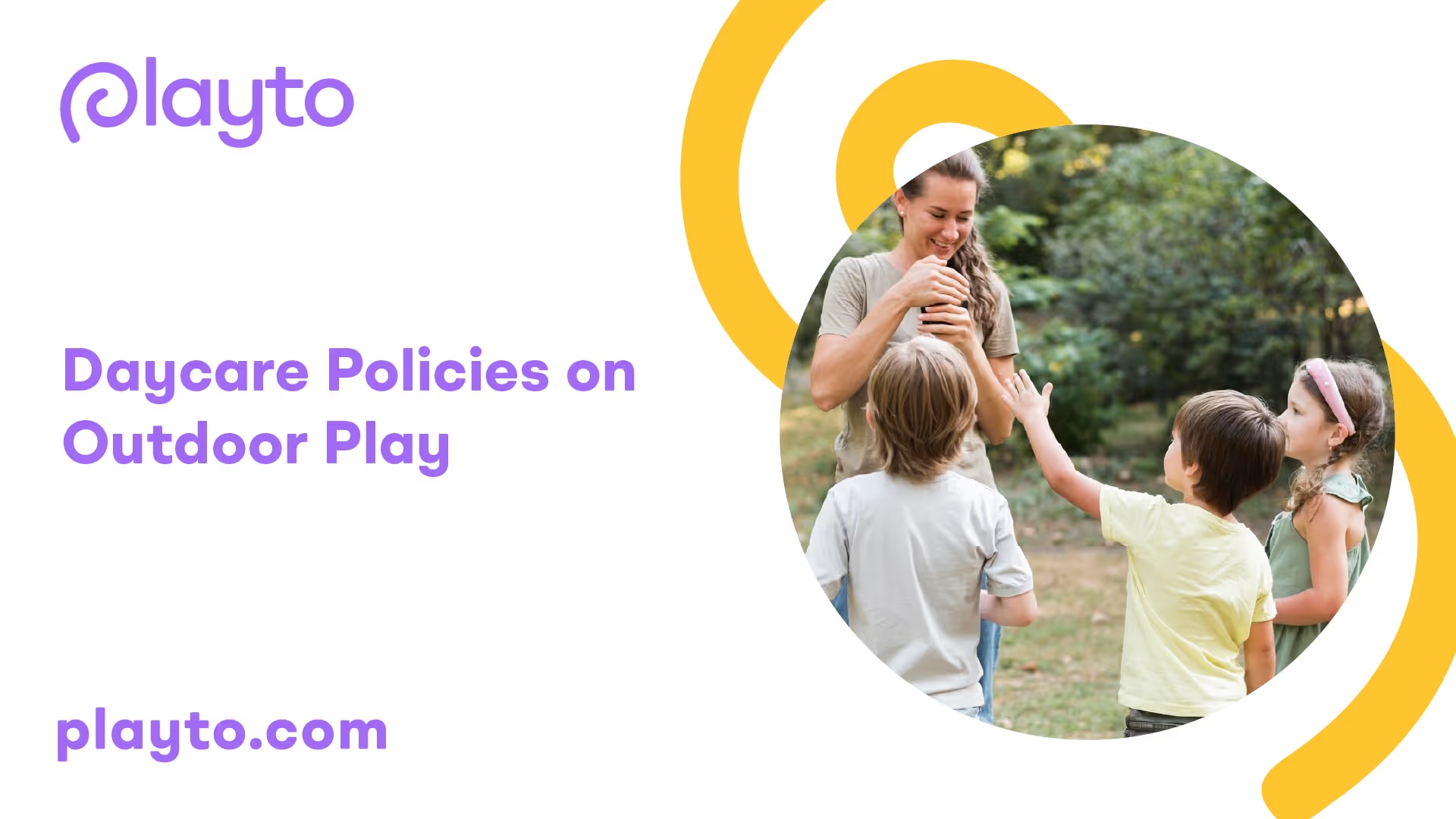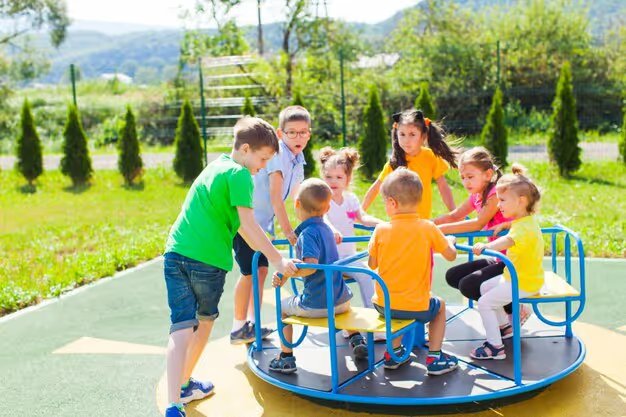
Importance of Outdoor Play Policies
When it comes to daycare policies, having specific guidelines and policies for outdoor play is crucial. This section will explore the benefits of outdoor play and the safety considerations that should be taken into account.
Benefits of Outdoor Play
Outdoor play provides numerous benefits for children's physical, cognitive, and social development. Outdoor play offers the following advantages:
- Physical Development: Outdoor play allows children to engage in physical activities that promote gross motor skills, coordination, and overall physical fitness. Running, climbing, jumping, and playing with balls or other outdoor toys can enhance their strength, balance, and agility.
- Cognitive Development: Outdoor play stimulates children's cognitive abilities by providing opportunities for exploration, problem-solving, and imaginative play. Being exposed to nature and the outdoor environment can also foster curiosity, creativity, and a sense of wonder.
- Emotional and Social Development: Outdoor play encourages social interaction, cooperation, and teamwork among children. They learn to communicate, negotiate, and resolve conflicts while engaging in group activities. Spending time outdoors also promotes emotional well-being, reduces stress, and enhances mood.
- Sensory Stimulation: The outdoor environment offers a wide range of sensory experiences, such as feeling different textures, hearing natural sounds, and observing various colors and shapes. These sensory stimuli contribute to children's sensory development and help them make sense of the world around them.
Safety Considerations
While outdoor play is highly beneficial, it's essential to prioritize safety when designing outdoor play spaces. Daycare policies on outdoor play should address the following safety considerations:
- Supervision Guidelines: Active supervision is crucial during outdoor play to ensure the safety and well-being of children. Adequate supervision helps to prevent accidents, respond to emergencies, and maintain a secure environment. Daycare policies should outline the required staff-to-child ratios and guidelines for continuous monitoring during outdoor activities.
- Developmental Opportunities: Different age groups have varying developmental needs and abilities. Daycare policies should consider age-appropriate activities, equipment, and play areas that promote the well-rounded development of children. Infants and toddlers require a safe and secure environment that supports their exploration and gross motor development. Preschool-age children benefit from play areas that encourage imaginative play and social interaction. School-age children require spaces that provide opportunities for physical challenges and skill development.
- Playground Surfacing: Ensuring the safety of playground surfaces is crucial to reduce the risk of injuries from falls. Daycare policies should specify the appropriate playground surfacing materials, such as sand, pea gravel, rubber mulch, or wood chips. These materials provide a soft and cushioned surface that absorbs falls. The depth of the surfacing material should meet safety standards, with a minimum of 6 inches for equipment less than 4 feet high and 9 inches deep for equipment up to 8 feet in height.
By establishing clear and comprehensive daycare policies on outdoor play, providers can ensure that children have a safe and supportive environment to engage in outdoor activities. These policies should consider the developmental needs of children, provide guidelines for supervision, and address safety measures such as appropriate playground surfacing.

Designing Outdoor Play Spaces
When it comes to daycare policies on outdoor play, designing appropriate and engaging outdoor play spaces is essential to ensure the safety and development of children. This section will explore two key considerations in designing outdoor play spaces: age-appropriate equipment and playground surfacing.
Age-Appropriate Equipment
Designing outdoor play areas that cater to the different developmental needs and abilities of children of varying age groups is crucial. Infants and toddlers (ages 0 – 2), preschool-age children (ages 3 – 5), and school-age children (ages 5 – 12) have different requirements and capabilities. It is important to create separate areas for each age group, ensuring that equipment and activities are suitable for their respective developmental stages.
For infants and toddlers, focus on providing a safe and secure environment that supports their exploration and gross motor development. Simple structures, such as low platforms with ramps, soft climbers, and age-appropriate swings, can be included.
Preschool-age children benefit from play areas that encourage imaginative play and social interaction. Consider adding equipment like sandboxes, climbing structures, slides, and interactive play panels to stimulate their creativity and physical skills.
School-age children require spaces that provide opportunities for physical challenges and skill development. Incorporate more complex and challenging structures, such as climbing walls, monkey bars, and sports equipment, to engage them in active play and encourage the development of their physical abilities.
Playground Surfacing
Playground surfacing is a critical aspect of outdoor play spaces, as it helps reduce the risk of injuries from falls. It is important to select materials that are soft enough to absorb impact and provide a safe landing surface. Some recommended surfacing materials include sand, pea gravel, rubber mulch, and wood chips.
The depth of the surfacing material should also be considered to ensure optimal safety. As a general guideline, the surface material should be a minimum of 6 inches deep for equipment less than 4 feet high and 9 inches deep for equipment up to 8 feet in height. This helps cushion falls and reduces the risk of serious injuries.
Regular maintenance and inspection of the playground surfacing are crucial to ensure its effectiveness and safety. Periodically check for any signs of wear or damage and promptly address any issues that may compromise the safety of the play area.
By carefully designing outdoor play spaces with age-appropriate equipment and suitable playground surfacing, daycare centers can create engaging and safe environments for children to explore, learn, and develop. It is important to regularly assess and update the play spaces to meet the changing needs of the children and ensure their well-being during outdoor play.

Creating Safe Outdoor Environments
Ensuring the safety of children during outdoor play is of utmost importance in daycare settings. Childcare centers should establish clear guidelines and policies to create safe outdoor environments for children. This includes supervision guidelines and providing developmental opportunities.
Supervision Guidelines
Active supervision during outdoor activities is a key aspect of daycare policies. Staff members have the responsibility to continuously scan the play area, move throughout the space, and maintain regular head counts to ensure the safety of all children [2]. Name-to-face checks and coordination among co-teachers can help prevent children from getting separated from the group.
Supervision guidelines should be age-appropriate, taking into account the different developmental needs and abilities of infants and toddlers, preschool-age children, and school-age children. Adequate staffing ratios should be maintained to ensure that staff members can effectively supervise children during outdoor play.
Developmental Opportunities
Outdoor play provides valuable developmental opportunities for children. Daycare policies should emphasize the importance of incorporating age-appropriate activities that support children's physical, social, and emotional development.
For infants and toddlers, outdoor play can involve sensory experiences, such as feeling different textures, listening to nature sounds, and exploring nature through sight and touch. For preschool-age children, outdoor play can include gross motor activities, imaginative play, and opportunities for social interaction. School-age children can benefit from structured games, sports, and cooperative play that promote teamwork and problem-solving skills.
By providing a variety of age-appropriate activities, daycare centers can support children's overall development and well-being. Staff members should be trained to facilitate outdoor play and create engaging experiences that enhance children's learning and enjoyment.
Creating safe outdoor environments involves not only supervision guidelines but also the provision of appropriate developmental opportunities. By establishing clear policies and guidelines, daycare centers can ensure that outdoor play is a safe and enriching experience for children. Encouraging active engagement, providing a range of activities, and maintaining a focus on child safety are essential elements of daycare policies on outdoor play.
Addressing Parental Concerns
When it comes to daycare policies on outdoor play, it's essential to address parental concerns and ensure open communication. Understanding family perspectives and implementing effective communication strategies can help foster a positive relationship between parents and the daycare center.
Understanding Family Perspectives
Caregivers should take the time to understand what an outdoor learning environment means to families and identify strong beliefs, values, and perceived risks. It's important to recognize that outdoor experiences can feel unsafe and cause uncertainty for some families, while others may strongly believe that being outdoors is an important part of their child's day [3].
By actively listening to parents' concerns and engaging in open dialogue, daycare centers can gain valuable insights into their unique perspectives. This understanding allows caregivers to address concerns effectively and tailor outdoor play policies to meet the needs of both the children and their families.
Communication Strategies
Open and transparent communication is crucial in addressing parental concerns regarding outdoor play policies. Daycare administrators should ensure that parents are well-informed about the importance of outdoor play and the specific policies in place. This can be achieved through various communication channels, such as:
- Parent Handbook: Including detailed information about outdoor play policies in the parent handbook ensures that parents have access to the guidelines and expectations. This document should clearly outline the benefits of outdoor play, safety measures taken, and the role of outdoor activities in child development.
- Orientation Sessions: During orientation sessions, daycare staff can emphasize the significance of outdoor play and address any concerns or questions parents may have. This is an opportunity to explain the rationale behind the policies and highlight the measures taken to ensure children's safety and well-being.
- Ongoing Communication: Regular communication channels, such as newsletters, emails, or parent-teacher meetings, allow daycare centers to provide updates on outdoor play activities, share success stories, and address any emerging concerns. This continuous dialogue reassures parents of the daycare center's commitment to their child's outdoor play experience.
By proactively addressing parental concerns and maintaining open lines of communication, daycare centers can build trust and collaboration with families. This partnership ensures that parents feel involved and informed about their child's outdoor play experiences, leading to a positive and supportive daycare environment.
To explore other daycare policies and their implications, check out our articles on daycare policies on parent involvement, daycare policies on photography and social media, daycare policies on celebrating birthdays, daycare policies on parent-teacher conferences, and daycare policies on holiday celebrations. Additionally, if you're interested in promoting outdoor play without compromising safety, our article on daycare policies on sick children provides valuable insights.
Encouraging Outdoor Play Activities
Encouraging children to engage in outdoor play activities is essential for their overall development and well-being. Outdoor play provides numerous benefits, including physical health benefits and the development of social and emotional skills.
Physical Health Benefits
Outdoor play promotes physical health by encouraging children to engage in activities that build gross motor skills. These activities include running, jumping, climbing, throwing, and kicking balls, which help foster a habit of being active and reduce the risk of health problems such as obesity, diabetes, and heart disease. Regular outdoor play also contributes to better sleep quality in children aged 2 to 5, as it combines physical activity, stress reduction, and exposure to natural light, leading to improved sleep patterns [4].
Engaging in outdoor play allows children to take appropriate risks, challenging themselves to run faster, climb higher, jump farther, and engage in new activities under the supervision of a caring adult. This fosters growth and development, as children learn to overcome obstacles and develop self-confidence. Moreover, outdoor play has been linked to a lower body mass index (BMI) in children, reducing the risk of obesity. In today's society, where childhood obesity rates are a concern, encouraging outdoor play can contribute to healthier lifestyles.
Here are some physical health benefits of outdoor play activities:
- Development of gross motor skills
- Improved cardiovascular health
- Enhanced coordination and balance
- Strengthening of muscles and bones
- Reduced risk of obesity
Social and Emotional Skills
Outdoor play also plays a vital role in the development of social and emotional skills in children. When children engage in outdoor activities together, they have opportunities to interact, cooperate, and communicate with their peers. These interactions help develop social skills, such as sharing, taking turns, and resolving conflicts.
Outdoor play provides a natural environment for children to practice socializing and forming friendships. It allows them to engage in imaginative play, role-playing, and collaborative games, fostering their creativity and problem-solving abilities. Through outdoor play, children learn to navigate social dynamics, negotiate rules, and develop empathy towards others.
In addition to social skills, outdoor play supports the development of emotional skills. Spending time in nature has a calming effect on children, reducing stress and anxiety. Outdoor play allows children to explore their surroundings, experience a sense of wonder, and connect with the natural world. This connection to nature promotes emotional well-being, resilience, and a sense of belonging.
Here are some social and emotional skills developed through outdoor play activities:
- Improved communication and socialization
- Enhanced creativity and imagination
- Increased self-confidence and self-esteem
- Development of empathy and understanding of others
- Reduced stress and improved emotional well-being
Encouraging outdoor play activities in daycare settings not only promotes physical health but also supports the social and emotional development of children. By providing ample opportunities for outdoor play, daycare centers create an environment that nurtures children's overall well-being.
Overcoming Challenges
When it comes to implementing outdoor play policies in daycare settings, there can be certain challenges that need to be addressed. Two common challenges that daycare centers may face are the lack of supervision and the need to educate staff and parents about the importance of outdoor play.
Lack of Supervision
Proper supervision is crucial during outdoor play to ensure the safety and well-being of the children. Daycare policies should emphasize the importance of active supervision during outdoor activities. Staff members should be trained and informed about their responsibilities, which may include continuous scanning, movement throughout the play area, regular head counts, name-to-face checks, and coordination among co-teachers to prevent children from getting separated from the group [2].
By actively engaging with the children during outdoor play, teachers can help alleviate complaints about children's behavior. Outdoor time should be viewed as an extension of the classroom, where teachers provide guidance and supervision to prevent conflicts and accidents. Administrators should ensure that teachers are actively engaging children in outdoor play and not using outdoor time as a break. Parents can also play a role in ensuring that their expectations for outdoor play are being met by visiting the daycare center and observing the outdoor activities.
Educating Staff and Parents
Another challenge often faced by daycare centers is the need to educate both staff and parents about the importance of outdoor play. Child care staff may sometimes have concerns about children's clothing, unsafe playground environments, and limited play options during inclement weather. It is important for daycare administrators to eliminate excuses for not engaging children in outdoor play by emphasizing its importance during orientation, outlining policies for outdoor play in the Parent Handbook, and ensuring that outdoor play areas are safe and well-maintained.
Daycare administrators should also provide ongoing education and training for staff members to help them understand the benefits of outdoor play and how it supports children's development. By highlighting the advantages of outdoor play and providing practical strategies for implementation, staff members can feel more confident and competent in promoting outdoor play among children.
Parents should also be educated about the importance of outdoor play and its role in children's overall development. Communication strategies, such as including information in newsletters, organizing parent workshops, and providing resources on the daycare's website, can help parents understand the benefits of outdoor play and encourage their support for outdoor play policies.
By addressing the challenges of lack of supervision and the need for education, daycare centers can create an environment that promotes and prioritizes outdoor play. This allows children to reap the numerous physical, cognitive, and social benefits that outdoor play provides.
References
- [1]: https://childcare.extension.org/basic-tips-to-keep-children-in-child-care-safe-outdoors/
- [2]: https://www.playto.com/blog/daycare-policies-on-outdoor-activities
- [3]: https://www.virtuallabschool.org/infant-toddler/learning-environments/lesson
- [4]: https://www.naeyc.org/resources/pubs/yc/may2019/outdoor-play-is-essential
- [5]: https://www.miracle-recreation.com/blog/why-should-my-child-play-outside-benefits-of-outdoor-play-for-kids/
- [6]: https://www.bamradionetwork.com/so-outdoor-play-at-child-care-centers-is-optional-huh/
